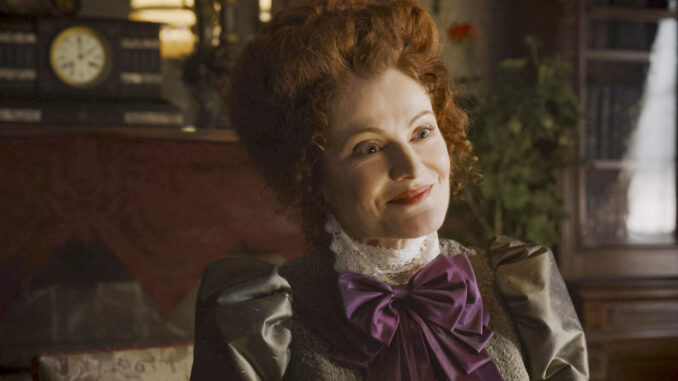
Beyond the Pearls: The Shocking Truth and Heartbreaking Humanity of Hetty Woodstone
Rebecca Wisocky, the actress who embodies the spectral society matron Hetty Woodstone in CBS's "Ghosts," doesn't just portray a comedic caricature; she breathes life (or rather, afterlife) into a woman grappling with societal constraints and a desperate desire for relevance, even in death. While the show delights in the witty banter and supernatural shenanigans of its haunted inhabitants, Wisocky's nuanced portrayal, particularly her revelations about Hetty's death, exposes a shocking truth that elevates the character beyond simple comic relief, painting a portrait of a woman deeply wounded by her past and desperately seeking connection.
Initially, Hetty presents as a quintessential Victorian stereotype: priggish, obsessed with decorum, and fiercely judgmental of modern sensibilities. Her disdain for Samantha, the living woman who can see the ghosts, provides ample opportunities for hilarious clashes. However, Wisocky has consistently hinted at a deeper wellspring of pain within Hetty, a vulnerability masked by her rigid facade. The "shocking truth" about Hetty's death, as revealed through flashbacks and subtle emotional cues, lies not in the how – poison consumed in a bout of supposed "female hysteria" – but in the why.
Wisocky's brilliance lies in conveying the underlying desperation that drove Hetty to that tragic end. She reveals that Hetty's life was a suffocating cage of societal expectations. Trapped in a loveless marriage with a philandering husband, deprived of agency and self-expression, Hetty found herself utterly powerless. Her obsession with respectability wasn't merely vanity; it was a desperate attempt to maintain control in a world that stripped her of it. The poison wasn't just a means of ending her suffering; it was a defiant act of self-determination, a desperate grab for control in a life where she had none.
The truly shocking truth, however, isn't simply the mechanics of Hetty's suicide, but the systemic oppression that led her to such a desperate act. Wisocky masterfully embodies the subtle cues of a woman suffocating under the weight of unspoken expectations. The tight pursing of her lips, the slight tremble in her voice, the way she clutches her pearls – these are not mere affectations, but manifestations of a deep-seated emotional turmoil that ultimately propelled her towards tragedy.
This understanding of Hetty's past transforms her present interactions with the other ghosts. Her initial disdain for Samantha, initially perceived as snobbery, becomes tinged with a poignant envy. Samantha possesses the freedom and autonomy that Hetty was denied. As the series progresses, Hetty's walls gradually crumble, revealing a yearning for connection and a willingness to learn from Samantha's liberated perspective. Wisocky expertly navigates this transition, showing us a woman slowly unburdening herself from the shackles of her Victorian upbringing.
Furthermore, Wisocky's portrayal highlights the tragic irony of Hetty's situation. Even in death, she is still trapped by her past, bound to the house she desperately sought to control in life. Her initial efforts to manipulate Samantha and maintain order within the ghostly community are echoes of her past struggles for agency. However, as she confronts the truth about her own death and the societal forces that shaped her, she begins to find genuine connection with the other ghosts, embracing a found family that transcends the rigid class structures of her time.
In conclusion, Rebecca Wisocky's portrayal of Hetty Woodstone is a testament to the power of nuanced performance. The "shocking truth" about Hetty's death isn't just a plot point; it's a window into the soul of a woman who was silenced and suffocated by societal expectations. Wisocky's dedication to understanding and portraying the complexities of Hetty's pain elevates the character beyond a comedic stereotype and transforms her into a poignant reminder of the enduring power of the past, and the importance of finding connection and understanding even in the afterlife. Her performance underscores the series' strength in blending lighthearted humor with profound themes of social commentary and the enduring human desire for belonging, even for a ghost clinging to her pearls.